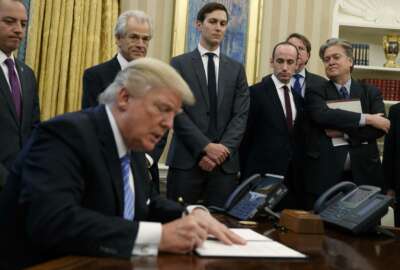

Peter Navarro, the assistant to the President and director of Trade and Industrial Policy at the White House, said 14 agencies spent more than $45 billion on...
The Trump administration is pushing agencies to apply stricter “Buy American” requirements to more than $45 billion in spending for infrastructure and construction projects.
President Donald Trump signed an executive order today strongly encouraging agencies to promote and endorse prime and subcontractors who receive loans, grants and other federal financial assistance to use American-made steel, iron, aluminum, concrete and other building and manufactured materials.
Peter Navarro, the assistant to the President and director of Trade and Industrial Policy at the White House, said in a briefing with reporters Thursday the executive order builds on the one the president signed in April 2017. That almost two year-old order required agencies to review their procurement rules and get rid of any loopholes that would give foreign products an advantage over American ones.
“What we’ve seen interestingly is an increase of $24 billion in spending on American made products,” Navarro said. “U.S. government spending on foreign goods has reached its lowest point in 10 years.”

The White House is building on that success with this new executive order, taking aim at 30 agencies, ranging from the Department of Transportation to the Environmental Protection Agency to the Army Corps of Engineers which provides grants, loans and other federal financial assistance for infrastructure programs.
“Each year more than 30 agencies award over $700 billion in federal financial assistance to more than 40,000 non-federal recipient organizations,” Navarro said. “If you look at fiscal 2016, of the 265 listings in the Catalog of Federal Domestic Assistance for infrastructure or construction projects, more than 200 didn’t require Buy American consideration. These projects across 14 different agencies added up to over $45 billion in expenditures.”
He added infrastructure has a broad definition to include everything from bridges to waterways to sewer systems to broadband to cybersecurity projects.
The EO gives agencies 90 days to implement the changes to any new financial assistance action. Within 120 days, the White House wants a report from agencies with details on “any tools, techniques, terms or conditions that have been used or could be used, consistent with law and in furtherance of the policy.”
“In preparing this report, the agency head shall take care to analyze whether covered programs within the agency head’s jurisdiction would support, through terms and conditions on new federal financial assistance awards under such covered programs, the imposition of a requirement to use iron and aluminum as well as steel, cement and other manufactured products produced in the United States in contracts, sub‑contracts, purchase orders or sub‑awards that are chargeable against such federal financial assistance awards,” the document states.
The Buy American law and regulations apply to all contracts, unless an agency receives a waiver or Congress provides a waiver to a specific industry. But, until now, the rules haven’t flowed down to loans, grants and other federal assistance programs.
Navarro said promoting Buy American requirements in federal programs create more manufacturing jobs and brings back about 20 cents out of every dollar spent through tax revenues.
Additionally, he said, Buy American requirements also strengthen the defense industrial base, which is a key focus of his office.
The Trump administration’s decision to apply Buy American requirements to loans, grants and other federal domestic assistance programs isn’t new.
Rep. Daniel Lipinski (D-Ill.) introduced the Buy American Improvement Act in 2017. The bill, which never got out of committee, would have set domestic content standards for indirect purchases by the Department of Transportation grantees, ensuring that tax dollars spent on aviation, highway, transit and rail infrastructure went to American made products. The legislation also would’ve expanded these requirements to a number of other federal grant programs.
Additionally, Congress and the Obama administration applied Buy American Act requirements to infrastructure projects under the 2009 Recovery Act. The law stated that unless a waiver was granted or one of three exceptions applied (non-availability, unreasonable cost, and inconsistent with the public interest), no appropriated funds or other funding made available by the act could be used for a project to construct, alter, maintain or repair a public building or public work unless all the iron, steel, and manufactured goods used were produced in the United States.
Copyright © 2025 Federal News Network. All rights reserved. This website is not intended for users located within the European Economic Area.
Jason Miller is executive editor of Federal News Network and directs news coverage on the people, policy and programs of the federal government.
Follow @jmillerWFED

